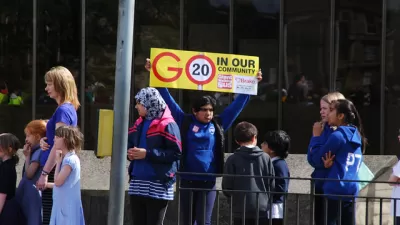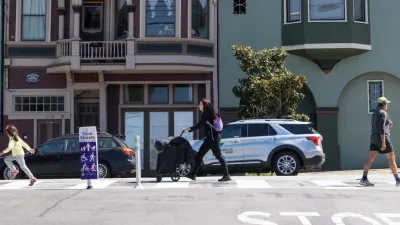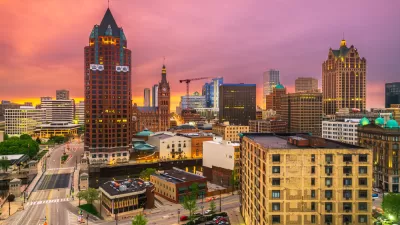Citing pedestrian and cyclist casualties, the Scottish capital will reduce speed limits on 80 percent of its streets to a mere 20 mph. Backers are pushing for additional complete streets improvements.

The last time Edinburgh adopted a citywide speed limit was 1934, and the number was 30 mph. Now, Anna Clark writes, "The easy-to-love capital city is rolling out a plan to cap the speed limit at 20 mph across 80 percent of its roads, including the entirety of its dense downtown. Key arterial roads will retain their speeds of 30 and 40 mph."
The speed limit change is an explicit move to encourage walking and biking, especially in the city center. "Edinburgh's move also syncs with the Scottish government's 2010 Cycling Action Plan, which aimed for 10 percent of all journeys to be taken by bike by 2020. When the plan was updated in 2013, urban areas were encouraged to introduce more 20 mph streets."
In its slow roads report, Transport Scotland emphasized that "'[The new limits] should not be set in isolation, but should be considered as part of a range of other measures to manage speeds, improve safety and meet other objectives, including the encouragement of active travel.'"
FULL STORY: Slower Speed Limits Give Cities a New Attitude About Biking, Walking, Breathing

Manufactured Crisis: Losing the Nation’s Largest Source of Unsubsidized Affordable Housing
Manufactured housing communities have long been an affordable housing option for millions of people living in the U.S., but that affordability is disappearing rapidly. How did we get here?

Americans May Be Stuck — But Why?
Americans are moving a lot less than they once did, and that is a problem. While Yoni Applebaum, in his highly-publicized article Stuck, gets the reasons badly wrong, it's still important to ask: why are we moving so much less than before?

Using Old Oil and Gas Wells for Green Energy Storage
Penn State researchers have found that repurposing abandoned oil and gas wells for geothermal-assisted compressed-air energy storage can boost efficiency, reduce environmental risks, and support clean energy and job transitions.

Greening Oakland’s School Grounds
With help from community partners like the Trust for Public Land, Oakland Unified School District is turning barren, asphalt-covered schoolyards into vibrant, green spaces that support outdoor learning, play, and student well-being.

California Governor Suspends CEQA Reviews for Utilities in Fire Areas
Utility restoration efforts in areas affected by the January wildfires in Los Angeles will be exempt from environmental regulations to speed up the rebuilding of essential infrastructure.

Native American Communities Prepare to Lead on Environmental Stewardship
In the face of federal threats to public lands and conservation efforts, indigenous groups continue to model nature-centered conservation efforts.
Urban Design for Planners 1: Software Tools
This six-course series explores essential urban design concepts using open source software and equips planners with the tools they need to participate fully in the urban design process.
Planning for Universal Design
Learn the tools for implementing Universal Design in planning regulations.
Heyer Gruel & Associates PA
City of Moreno Valley
Institute for Housing and Urban Development Studies (IHS)
City of Grandview
Harvard GSD Executive Education
Salt Lake City
NYU Wagner Graduate School of Public Service
City of Cambridge, Maryland





























